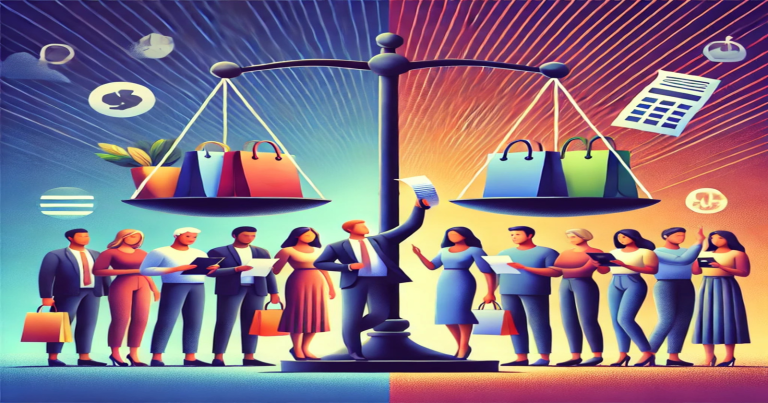Consumer rights awareness refers to every consumer’s fundamental rights while buying goods and services. This understanding is to make the information for public use and help people be more aware of fair practices and redressal when needed. Simply, it teaches consumers how to protect themselves in the marketplace.
Imagine buying a product that turns out to be bad or you pay for a service that was not provided. What do you do? This is where consumer rights awareness comes into play. It helps you understand your rights as a buyer and shows you what action to take if something goes wrong.
Consumer rights awareness has increased with the growth of businesses, products, and services worldwide. Consumers face fraud, substandard products, false advertising, and unfair trade practices. Without awareness, consumers can fall prey to these problems. But with the right knowledge, they can fight back, demand quality, and ensure they are treated fairly.
What Is Consumer Awareness?
Consumer awareness is the knowledge of one’s rights and responsibilities as a buyer in the marketplace. It enables consumers to make informed choices, avoid fraud, and get fair treatment. It also encompasses knowledge of product details, comparison of prices, checking for quality, and knowing legal rights if something goes wrong.
Consumers are exposed to several risks in the market. These include counterfeit products, deceptive advertisements, and low-quality goods. Without sufficient knowledge, they may become easy prey for these unfair practices. Consumer awareness can prevent such problems by educating the buyer about what to look for when purchasing goods or services.
Consumer awareness is not only about rights but also about responsibility. An informed consumer reads label information, compares options, retains copies of his or her bills for future reference, and files complaints when appropriate. This active role contributes to better quality in products and services marketed.
History of Consumer Rights Awareness in India
Ancient traders did observe ethical trade rules to avoid exploitation, but there was no formal legislation for consumer protection. The growth of trade and commerce made necessary an orderly and systemic protection of the consumers. Industrialization in India during post-independence days marked an excellent tempo for development; simultaneously, there was an inherent lack of orderliness in consumer protection schemes.
| Year | Event | Significance |
| 1962 | U.S. President John F. Kennedy’s Speech | Introduced the idea of consumer rights globally |
| 1986 | Consumer Protection Act (CPA) Passed | Gave legal power to protect Indian consumers |
| 1991 | Economic Reforms in India | Increased need for stronger consumer laws |
| 2002 | Amendment to Consumer Protection Act | Strengthened consumer forums and legal processes |
| 2019 | New Consumer Protection Act Introduced | Modern laws covering e-commerce and digital issues |
Need for Consumer Rights Awareness
The need for consumer rights awareness has never been greater. As the number of products and services increases, consumers are exposed to fraud, poor-quality goods, and unethical business practices. Consumers can easily be exploited if they are not aware.
Protection Against Unfair Practices
Many businesses use misleading advertisements, false claims, and hidden charges to deceive consumers. Consumer rights awareness helps people identify these tricks and take action. Knowing your rights means demanding fair treatment, accurate information, and honest dealings.
Empowerment of Consumers
An educated consumer is an empowered consumer. Knowledge equips people with the confidence to question sellers, demand product information, and reject shoddy goods. It also empowers consumers to demand restitution if they are cheated or injured by a product or service.
Facilitating Ethical Business Practices
Legitimate businesses thrive when consumers know what rights they are entitled to. They tend to avoid unscrupulous practices because customers can report them for unfair practices. This way, companies ensure that quality is maintained and transparent procedures are followed. This creates a healthy marketplace where both buyers and sellers benefit.
Legal Protection
Consumer rights awareness makes people aware of legal protections such as the Consumer Protection Act in India. It tells them about consumer courts, complaint procedures, and how to seek redressal for grievances. This knowledge ensures that consumers are not helpless when they face problems.
Quality Products and Services
Consumers’ demands for better products and services compel businesses to enhance their offerings. Awareness creates competition among businesses, driving up quality, reducing prices, and delivering fine customer service.
Importance of Consumer Rights And Awareness
The awareness of consumer rights is essential today. Its benefits include protecting consumers from exploitation, promoting fair trade, and ensuring a more predictable marketplace.
Consumer rights awareness is critical beyond merely protecting a buyer from a fraudulent deal: building the basis for a strong economy, fair promotion, and fulfilment. Knowing what rights to exercise would allow customers to make prudent choices, ensure quality, and have a system that holds business concerns accountable.
Building Confidence among Consumers
Awareness gives the confidence to buy products and services without any fear. The confidence of knowing the legal protection for redressal, if required, would make a consumer feel secure in making the purchases. Confidence, therefore, will boost consumer spending and further boost the economy.
Preventing Exploitation
Without knowledge of their rights, consumers are easy targets for exploitation. Sellers may overcharge, provide substandard goods, or engage in unfair trade practices. Consumer rights awareness reduces these risks by empowering buyers to recognize and challenge unethical behaviour.
Promoting Responsible Consumer Behavior
Awareness is not just knowing your rights but also being aware of your responsibilities. Consumers should not support illegal and harmful products, should check the authenticity of the products, and should avoid wastage. Thus, responsible behaviour leads to sustainable consumption and the benefit of society.
Strengthening Legal Systems
It will improve the legal system because of consumers’ active reporting about unfair practices. Consumer courts become efficient, and new laws are enacted to protect buyers. It will make sure that justice reaches all pockets and not only to the wealthy.
| Key Point | Explanation |
| Consumer Confidence | Helps buyers feel secure while purchasing |
| Reduces Exploitation | Protects against fraud and unfair practices |
| Promotes Responsibility | Encourages ethical consumer behavior |
| Strengthens Legal Systems | Supports the development of strong legal frameworks |
What are The 8 Consumer Rights and Awareness
There are specific rights concerning a consumer that protect from unfair practice. These rights ensure they are appropriately treated and receive quality products and proper information. Let’s look in detail into the 8 rights of the consumer.
Right to Safety
Consumer rights must be protected from products or services hazardous to their health or life. For instance, food items have to meet safety standards so that one does not face any health problems.
Right to Information
Consumers are entitled to know everything regarding products they buy, such as price, quality, composition, shelf life and service conditions. This enables them to make the right choices.
Right to choose
Customers can exercise options within products and services available at competitive prices. They are not compelled to purchase an item when its alternative is available.
Right to be heard
Consumers are free to lodge grievances if there are any problems. The concerns are heard, and businesses and the government take suitable steps.
Right to Redressal
When there is some deficiency in the product or poor quality service, the consumers should get a substitute or appropriate reimbursement. Consumers can also resort to consumer courts to redress such complaints.
Right to Consumer Education
Consumers should be educated about their rights and duties. Awareness campaigns, advertisements like “Jago Grahak Jago,” and school curriculums are helpful.
Right to a Safe Environment
The consumer has the right to live and work in a safe and, sustainable, healthy environment. Consumers are protected against pollution and unwholesome trade practices.
Satisfaction of Basic Needs
All consumers have a right to obtain fundamental goods and services such as food, water, shelter, and health, considered necessities for human survival.
| Right | Meaning |
| Right to Safety | Protection from harmful products |
| Right to Information | Access to complete and accurate product details |
| Right to Choose | Freedom to select from a range of products |
| Right to Be Heard | Opportunity to express complaints |
| Right to Redressal | Right to seek compensation for grievances |
| Right to Consumer Education | Learning about consumer rights and responsibilities |
| Right to a Healthy Environment | Living in a safe, pollution-free environment |
| Right to Satisfaction of Basic Needs | Access to essential goods and services |
What Are Consumer Rights and Responsibilities?
Consumers hold rights and duties, and they enjoy fair market play. An obligation-conscious consumer encourages ethical trade while promoting sustainable growth. Having rights does not necessarily mean one disregards one’s responsibilities.
| Consumer Rights | Consumer Responsibilities |
| Right to Safety | Ensure you buy safe products by checking quality certifications (e.g., ISI, FSSAI). |
| Right to Information | Read product labels, verify product details, and ask questions before buying. |
| Right to Choose | Make informed decisions by comparing products and services. |
| Right to Be Heard | Speak up about grievances through proper complaint channels. |
| Right to Redressal | File complaints when wronged and follow up for justice. |
| Right to Consumer Education | Stay updated on consumer rights through awareness programs like “Jago Grahak Jago.” |
| Right to a Healthy Environment | Promote eco-friendly practices and support sustainable products. |
| Right to Satisfaction of Basic Needs | Use essential resources responsibly and avoid wastage. |
Consumer Rights Awareness FAQs
What is consumer awareness?
Consumer awareness is understanding your rights and responsibilities as a buyer to make informed decisions and avoid unfair practices.
Why should a consumer be aware of his rights?
Awareness helps consumers protect themselves from fraud, demand quality products, and seek justice if treated unfairly.
What are the 8 consumer rights?
The 8 consumer rights include the right to safety, information, choice, being heard, redressal, consumer education, a healthy environment, and basic needs satisfaction.
What is the significance of consumer awareness?
Consumer awareness is essential for protecting the buyers, fair trade, ethical business practices, and legal systems.
What is ‘Jago Grahak Jago’?
“Jago Grahak Jago” is a government campaign in India to educate consumers about their rights and responsibilities through advertisements and awareness programs.


